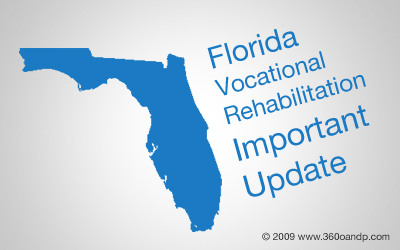
The Division of Vocational Rehabilitation (VR) is one of the best kept secrets in the orthotic and prosthetic industry. VR agencies vary from state to state and can be included in various larger divisions, such as the Department of Labor. In Florida, Vocational Rehabilitation is part of the Florida Department of Education.
VR provides consumers with disabilities the ‘tools’ they need to either find jobs or maintain a current job. These ‘tools’ can be job training, therapy, or orthotic/prosthetic services. VR provides funding for these ‘tools’ so that disabled individuals can become, or remain, part of the workplace. If the individual’s orthotic or prosthetic situation prevents him or her from working, that person may be a candidate for funding.
State VR agencies use a combination of federal and state funding to serve disabled individuals. The challenge is to meet all the needs of eligible individuals while adhering to a fiscal year budget. In order to do this, VR agencies must ensure they are the payer of last resort. For example, if a comparable service is covered by a private insurance or Medicaid, VR should not assume financial responsibility for that service. If a VR agency is in danger of exceeding the budget allocation, the agency must implement policies that ensure fiscal security.
Financial Needs Test: Co-payments
Every state’s Division of VR works differently. Previously, consumer income was not part of the picture for Florida’s Vocational Rehabilitation office. However, Florida’s VR has now established a financial needs test, where a consumer must submit information on family/household income. Depending on this income, a co-payment may be implemented for the orthotic/prosthetic service. The co-payment amount will be paid directly to the orthotic/prosthetic provider by the disabled individual. Individuals with the highest income levels pay the largest percentages of the cost for the service. However, the level of the individual’s financial participation cannot effectively deny the individual a necessary service. This financial needs test must also take into account disability related expenses.
Many states have already implemented this financial needs test. In Florida’s most recent 2008 move towards this implementation, it followed the lead of many states struggling to meet the needs of the growing disabled population.
The goal of establishing a financial needs test is to avoid the more severe policy of Order of Selection.
Order of Selection
VR agencies typically categorize individuals into one of three categories: disabled, significantly disabled, and most significantly disabled. Order of Selection is a policy that establishes a waiting list based on the severity of the disability. Once the Order of Selection is implemented, individuals with the most significant disabilities must be serviced first. It is possible that people with mild disabilities will not be served and only a small percentage of the disabled population would receive services from VR. Although the type of disability cannot be factor in the Order of Selection, the effect that the disability has on employment outcome is a major factor. The main criteria to define a ‘significant disability’ are:
· The physical or mental disability seriously limits one or more functional capabilities related to employment (mobility, communication, self-care, self-direction, interpersonal skills, work tolerance, or work skills).
· The individual will be expected to require multiple VR services over an extended period of time.
· The condition is considered a disability by VR and poses a significant functional limitation.
Most states that have implemented Order of Selection classify a ‘most significant disability’ as having an effect on three capabilities, such as (1) mobility, (2) communications, and (3) self-care, or any combination of the three categories listed above. Some states, such as Kentucky, require four. Georgia requires two.
A ‘most significant disability’ would typically require VR services for 6 months or more.
Once all the ‘most significantly disabled’ individuals on the waiting list have been served, the AR agency will address the ‘significantly disabled’, and lastly, the ‘disabled’. It is possible for individuals on the waiting list to wait indefinitely, essentially never receiving VR services.
Unfortunately, despite Florida’s attempt to reign in the budget by using the financial needs test and co-payment policy, Florida’s VR agency has now implemented Order of Selection.
It will remain to be seen how amputation or other orthotic conditions will be classified in Florida’s VR Order of Selection. Many amputees would stress that an amputation could easily have an effect on three or more functional categories. Unfortunately, once a state implements the Order of Selection, it is nearly impossible to terminate it. Hanging in the balance are amputees, and individuals with other orthopedic conditions, who are already faced with unfair insurance exclusions and limitations for prosthetics/orthotics. These people may now be left with one less option.
Disabled Floridians wanting to be part of the work force, however, should continue contacting VR for services. VR counselors will still be available to point consumers in the right direction and to find other possible resources. Afterall, even a long waiting list offers a glimmer of hope.